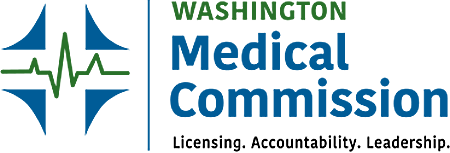Opioid Prescribing Best Practices: Updates for 2021 and Beyond
This webinar occurred on May 3, 2021.
-
CME Evaluation: This activity meets the opioid education requirement as defined by the Washington Medical Commission
Join the Washington Medical Commission for an educational opportunity on Best Practices for Opioid Prescribing. The webinar will cover:
-
The types of pain governed by these rules and the exclusions.
-
Coprescribing requirements.
-
Prescription Monitoring Program (PMP) requirements.
Educational Objectives
Upon completion of this educational activity, participants should be able to:
- Analyze the current landscape of opioid prescribing and regulation.
- Identify the most commonly encountered problematic prescribing behaviors that are associated with discipline.
- Assess practice patterns frequently associated with problematic opioid prescribing.
Target Audience
This activity is designed to educate commission members, practitioners, medical regulatory staff, and the public.
Speaker Biographies
Alden Roberts, MD, MMM, FACS
Dr. Robert’s background is in general surgery and hospital administration. He has been on the medical Commission since 2015, serving as WMC Chair, Member of Opioid Prescribing and Monitoring Joint Task Force and Co-chair of the WMC Opioid Rules Committee. He received his MD degree from LSU in New Orleans and completed his residency at Los Angeles County – USC medical Center before moving to Vancouver, WA.
Gregory Terman, MD
Gregory Terman is a Professor of Anesthesiology and Pain Medicine at the University of Washington where he has been on faculty since completing his Anesthesiology residency and Pain Management fellowship there in 1991. He is also Director of the Acute Pain Service at the University of Washington Medical Center and a Pro Tem Commissioner for the Washington Medical Commission. He has spent much of his research and clinical career probing the risks and benefits of opioid analgesics including work as President of the American Pain Society, an advisor to the FDA on numerous occasions and a member of the groups formulating the AMDG and CDC Opioid prescribing guidelines as well as the advisory committee for the NIH’s National Pain Strategy.
Continuing Medical Education
Accreditation Statement
This activity has been planned and implemented in accordance with the accreditation requirements and policies of the Accreditation Council for Continuing Medical Education (ACCME) through the joint providership of the Federation of State Medical Boards and the Washington Medical Commission. The Federation of State Medical Boards is accredited by the ACCME to provide continuing medical education for physicians.
Credit Designation Statement
The Federation of State Medical Boards designates this internet enduring activity for a maximum of 1.0 AMA PRA Category 1 Credit™. Physicians should claim only the credit commensurate with the extent of their participation in the activity.
Course Director
Alden Roberts, MD
Washington Medical Commission
Commercial Support
This learning activity is not funded by any commercial entity.
However, the Washington Medical Commission gratefully acknowledges the unrestricted educational grant from the FSMB Foundation in the amount of $10,000 to support this activity.
Disclosure of Commercial Interest
As an organization accredited by the ACCME, the Federation of State Medical Boards (FSMB) requires that the content of CME activities and related materials provide balance, independence, objectivity, and scientific rigor. Planning must be free of the influence or control of a commercial entity and promote improvements or quality in healthcare. All persons in the position to control the content of an education activity are required to disclose all relevant financial relationships in any amount occurring within the past 12 months with any entity producing, marketing, re-selling, or distributing health care goods or services consumed by, or used on patients.
The ACCME defines “relevant financial relationships” as financial relationships in any amount occurring within the past 12 months that create a conflict of interest. The FSMB has implemented a mechanism to identify and resolve all conflicts of interest prior to the activity. The intent of this policy is to identify potential conflicts of interest so participants can form their own judgments with full disclosure of the facts. Participants will be asked to evaluate whether the speaker’s outside interests reflect a possible bias in the planning or presentation of the activity.
The speakers, course director and planners at the Federation of State Medical Boards and the Washington Medical Commission have no relevant financial interests to disclose.
Disclosure of Unlabeled Uses
This educational activity may contain discussion of published and/or investigational uses of agents that are not approved by the U.S. Food and Drug Administration. For additional information about approved uses, including approved indications, contraindications, and warnings, please refer to the prescribing information for each product, or consult the Physicians’ Desk Reference.
Faculty and Staff Disclosures
No speakers or persons in control of content reported intent to reference unlabeled/unapproved uses of drugs or products.



